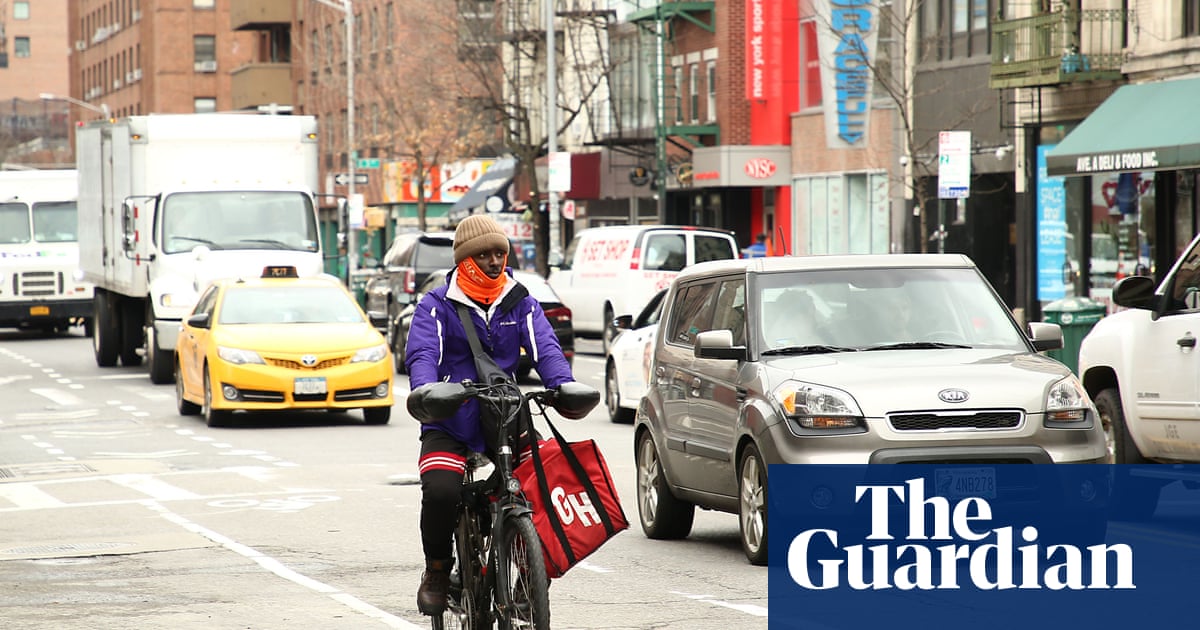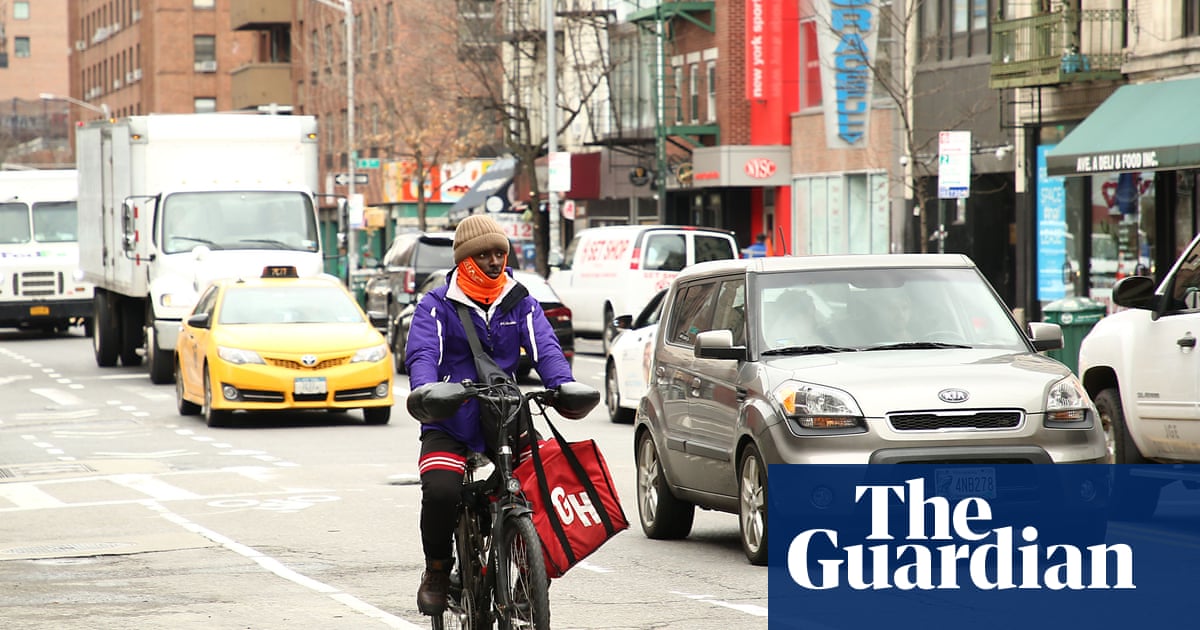As the pandemic gets worse, delivery workers will get sick and very likely some of us will die. At what point does it become too much?

Things were looking up for Blake Volkan. The 33-year-old Turkish Russian immigrant had been delivering food on a bicycle in New York for five years, earning as little as $3.90 a trip on platforms like Caviar and Grubhub. Last year, he got married, quit delivery, and earned a handymans certification before landing a subcontracting job doing repairs for a hotel. The pay was much better, and he noticed the difference in how people would treat him. Doing delivery, people treat me like a dog. But as a handyman? Yes, sir, smiling, How are you, and everything.
Then the coronavirus hit, and the hotel told Volkan not tocome in any more. His wife was furloughed from her job. Volkan realized he needed to get back on the bike and fire up the old apps. I like my job, but at the moment I have to survive, he told me.
Like Volkan, I am among tens of thousands of couriers in New York City, suddenly thrust to the frontlines of a deadly global pandemic. It was already a dangerous job our injury rates run up to 44 times those of the average American job; seven of us were killed in New York in 2019 alone and it has become far more dangerous now. We are called heroes and finally being acknowledged as essential, but the truth is this job was never the first choice for many of us.
For me, this job is a supplement to freelance writing; I decided to stop doing deliveries when the first few coronavirus cases were confirmed in New York. But others dont have that option. While writing this piece I spoke to workers aged 18 to 58, many of whom are pressing on in spite of unsafe conditions. There are many first-time delivery workers, laid off from other jobs, learning how to use the apps. No one is making a ton of money, and everyone is nervous.
It doesnt matter whether youve been doing this work for a day or a half decade: platforms like Grubhub, Uber Eats, Postmates and DoorDash (which recently purchased Caviar from Square) consider us independent contractors and we are therefore not entitled to health insurance, workers compensation, much less basic support from a human being. When the outbreak began, the apps simply sent out emails that sounded copy-and-pasted from the CDC (Stay home and wash your hands!).
Now, apparently worried about losing market share, the apps have temporarily waived commission fees for restaurants and cut customers delivery fees to zero. Yet they have offered no bonuses or hazard pay for workers the assumption is that we are disposable. The farthest they have gone is to promise up totwo weeks pay if a worker presents proof of a Covid-19 diagnosis, something that is difficult to obtain even with obvious symptoms. Workers who have tried requesting payments say the process is a nightmare.
In practice, our best hope is to be careful and pray. Volkan considers himself well prepared, thanks to an ample supply of face masks and gloves from his handyman work. But he is getting scared as he notices more and more couriers coughing and looking sick. Many dont have masks.
Even with protective gear, delivering food to a locked-down city has become total chaos. Demand is surging from the millions of New Yorkers suddenly forced to stay home, yet restaurants are severely short-staffed. Recently, Volkan was assigned to pick up food from a trendy West Village eatery that had begun offering delivery during the lockdown. Upon arrival he saw dozens of couriers crowded together on the sidewalk, and inside, what appeared to be a single cook, struggling to handle hundreds of orders. Volkan waited an hour for the order before police came and ordered everyone to disperse. The restaurant canceled all the orders and Volkan was not paid. He just moved on.
The apps have hyped up a new no-contact delivery option, which allows couriers to leave food in a buildings lobby to encourage physical distancing. But not all customers abide by it, or appreciate it. After completing one no-contact delivery recently, Volkan said he received a call from the customer, cursing at him. He screamed, You son of a bitch, do your job properly! It was my first time getting that in five years.
Usually, high demand means more orders, which for couriers means more earnings. But since the outbreak, Volkan has accepted multiple orders only to discover upon arriving that the requested restaurant was shuttered. With no way to cancel in-progress deliveries using his Caviar app, he has had to message a support agent to request the cancellation a process which usually takes minutes, but during the pandemic has taken as long as four hours, preventing new orders from being sent in the meantime. Once, out of desperation, he rode his bike empty-handed to the customers address and marked the order delivered just so he could continue working. I called the customer; Im like, look, Im sorry, youre not going to get your order. Please contact Caviar.
Most worryingly, hygiene has proven surprisingly difficult. Despite the pandemic, restaurants have been refusing to allow couriers to wash their hands in the sink. To make do, Volkan traded some of his face masks with another delivery worker for some hand sanitizer the other worker had ordered through DoorDash. DoorDash charged the worker $5 for shipping (other workers have been charged $10-$40). The bottles were so small, Volkan said. Its so cheap but they want the five dollars. They got to make a profit off of everyone. I contacted Grubhub, Postmates, Square, and Doordash for comment but did not receive a response before publication. A spokesperson for Uber Eats acknowledged the virus was especially concerning for people who drive and deliver with Uber. In these difficult times, their well-being is at the top of our minds, and we have a dedicated team working around the clock to support them the very best we can.
According to some estimates, on-demand food is set to be a $385bn industry by the end of this decade. Grubhubs stock has jumped nearly 33% since the announcement of New York Citys lockdown; DoorDash has recently filed for an IPO, with a pre-pandemic valuation of $13bn. In a call with shareholders on 19 March when two hundred people in the United States had died from the virus Ubers chief executive, Dana Khosrowshahi, said the companys Eats business was growing and revealed Uber had a $10bn pile of unrestricted cash. In any crisis, liquidity is key, he said. The day after the call, Ubers stock jumped 40%.
That financial firepower has not been deployed for us. Instead, we are fed hazy rhetoric. According to Doordash, Were all in this together (until you want benefits; then youre an independent contractor). In a self-congratulatory blogpost last week, Uber announced increasing earning opportunities for Uber Eats rather than a pay increase, this turned out to simply be a new feature allowing Uber rideshare drivers to also deliver food. This isnt helpful. As the pandemic continues to worsen, it is a matter of certainty that delivery workers will get sick and its more than likely that some of us will die. At what point does it become too much?
The companies bet that our individual precarity will motivate us to keep delivering until we land in the hospital; that we are not organized enough to stand up to them. But in the last week, gig workers for the grocery delivery service Instacart, as well as workers for Amazon and Whole Foods, have gone on strike to protest unacceptable working conditions. I am waiting for takeout couriers to do the same.
Laws are coming around to our side: recently the New York court of appeals ruled Postmates workers should be considered employees for the purposes of unemployment benefits; a law in California signed last year, Assembly Bill 5, reclassifies gig workers as employees more generally, though it has not yet been implemented. The apps are fighting these efforts tooth-and-nail to protect their outsized profits. They should think about protecting their workers for a change.
Until then, well have to make it on our own. Recently, to try and pad his income, Volkan told me he had started buying a few shares of gig-work companies stocks. After all, this could be the closest hell ever get to owning part of the industry hes given years of labor to.
But would he buy Square or DoorDash? Hell no, he said without hesitation. Why? Because they dont care about us, thats why.
Read more: https://www.theguardian.com/world/2020/apr/03/food-courier-coronavirus-pandemic-new-york


Recent Comments